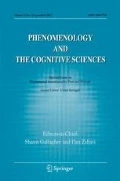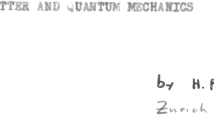Abstract
When he formulated the program of neurophenomenology, Francisco Varela suggested a balanced methodological dissolution of the “hard problem” of consciousness. I show that his dissolution is a paradigm which imposes itself onto seemingly opposite views, including materialist approaches. I also point out that Varela's revolutionary epistemological ideas are gaining wider acceptance as a side effect of a recent controversy between hermeneutists and eliminativists. Finally, I emphasize a structural parallel between the science of consciousness and the distinctive features of quantum mechanics. This parallel, together with the former convergences, point towards the common origin of the main puzzles of both quantum mechanics and the philosophy of mind: neglect of the constitutive blindspot of objective knowledge.
Similar content being viewed by others
References
Anscombe, G. E. M. 1957. Intention. Oxford: Basil Blackwell.
Apel, K.-O. 1976. Causal explanation, motivational explanation, and hermeneutic understanding. In: G. Ryle (ed), Contemporary Aspects of Philosophy. London: Oriel Press.
Apel, K.-O. 1980. Towards a Transformation of Philosophy. London: Routledge and Kegan Paul.
Audi, R. (ed). 1999. Cambridge Dictionary of Philosophy. Cambridge: Cambridge University Press.
Bitbol, M. 1996a. Mécanique quantique, une introduction philosophique. Paris: Flammarion.
Bitbol, M. 1996b. Schrödinger's Philosophy of Quantum Mechanics. Dordrecht: Kluwer.
Bitbol, M. 1998. Some steps towards a transcendental deduction of quantum mechanics. Philosophia Naturalis 35: 253-280.
Bitbol, M. 1999. L'alter-ego et les sciences de la nature, Autour d'un débat entre Schrödinger et Carnap. Philosophia Scientiae 3: 203-213.
Bitbol, M. 2000. Physique et philosophie de l'esprit. Paris: Flammarion.
Bitbol, M. 2001. Non-representationalist theories of cognition and quantum mechanics. SATS (Nordic Journal of Philosophy) 2: 37-61.
Bitbol, M. 2002. Radioactivity without particles? Mott's account of alpha-ray tracks in cloud chambers. In: C. Blondel, J. Hughes, P. Radvanyi, and R. H. Stuewer (eds), History of Radioactivity (in press).
Blackburn, S. 1993. Essays in Quasi-realism. Oxford: Oxford University Press.
Bohr, N. 1987. Atomic Theory and the Description of Nature. Woodbridge: Ox Bow Press.
Bouveresse, J. 1987. Le mythe de l'intériorité. Paris: Editions de Minuit.
Carnap, R. 1936. Existe-t-il des prémisses de la science qui soient incontrôlables? Scientia LX: 129-135.
Carnap, R. 1967. The Logical Construction of the World, London: Routledge and Kegan Paul.
Chalmers, D. J. 1995. Facing up to the problem of consciousness. Journal of Consciousness Studies 2: 200-219.
Chalmers, D. J. 1996. The Conscious Mind: In Search of a Fundamental Theory. Oxford: Oxford University Press.
Chalmers, D. J. 1997. Moving forward on the problem of consciousness. Journal of Consciousness Studies 4: 3-46.
Churchland, P. M. and Churchland, P. S. 1998. On the Contrary. Cambridge, MA: MIT Press.
Churchland, P. S. 1986. Neurophilosophy: Toward a Unified Science of the Mind-Brain. Cambridge, MA: MIT Press.
Clark, A. 1997. Being There. Cambridge, MA: MIT Press.
Darwin, C. G. 1929. A collision problem in the wave mechanics. Proceedings of the Royal Society, London A124: 375-394.
Dennett, D. 1992. Consciousness Explained. New-York: Little, Brown and Co.
Depraz, N. 1999. When transcendental genesis encounters the naturalization project. In: J. Petitot, F. J. Varela, B. Pachoud, and J.-M. Roy (eds), Naturalizing Phenomenology. Stanford, CA: Stanford University Press.
Depraz, N., Varela F. J., and Vermersch P. 2002. On Becoming Aware: An Experiential Pragmatics. Amsterdam: Benjamins Press.
Engel, P. 1996. Philosophie et Psychologie. Paris: Gallimard.
Edelman, G. 1994. Bright Air, Brilliant Fire. London: Penguin.
Flanagan, O. 1992. Consciousness Reconsidered. Cambridge: Cambridge University Press.
Föllesdal, D. 1984. Husserl's theory of perception. In: H. L. Dreyfus (ed), Husserl, Intentionality and Cognitive Science. Cambridge, MA: MIT Press.
Goldman, A. I. 1989. Interpretation psychologized. Mind and Language 4: 161-185.
Goldman, A. I. 1992. In defense of the simulation theory. Mind and Language 7: 104-119, 1992.
Gordon, R. M. 1986. Folk-psychology as simulation. Mind and Language 1: 158-171.
Gordon, R. M. 1992. The simulation theory: objections and misconceptions. Mind and Language 7: 11-33.
Greenwood, J. D. 1999. Simulation, theory-theory and cognitive penetration: no “instance of the fingerpost”. Mind and Language 14: 32-56.
Hacker, P. M. S. 1993. Wittgenstein, Meaning and Mind (Part I: Essays), Volume 3 of An Analytical Commentary of the Philosophical Investigations. Oxford: Basil Blackwell.
Hardcastle, V. G. 1996. The why of consciousness: a non-issue for materialists. Journal of Consciousness Studies 3: 7-13.
Heisenberg, W. 1930. The Physical Principles of the Quantum Theory. Chicago: University of Chicago Press.
Heisenberg, W. 1990. Physics and Philosophy. London: Penguin.
Heisenberg, W. 1998. Philosophie, le manuscrit de 1942. Paris: Seuil.
Held, C. 1994. The meaning of complementarity. Studies in History and Philosophy of Science 25: 871-893.
Husserl, E. 1928. Ideen zur Einer Reinen Phaenomenologie und phaenomenologischen Philosophie. Halle: Max Niemeyer.
Jackson, F. 1997. What Mary did not know. In: N. Block, O. Flanagan, and G. Güzeldere (eds), The Nature of Consciousness. Cambridge, MA: MIT Press.
Lakatos, I. 1978. The Methodology of Scientific Research Programmes, Philosophical Papers, Volume 1. Cambridge: Cambridge University Press.
Le van Quyen, M., Martinerie, J., and Varela, F. J. 1999. Spatio-temporal dynamics of epileptogenic networks. In: P. Grassberger and K. Lehnertz (eds), Chaos in the Brain? Singapore: World Scientific.
Lockwood, M. 1989. Mind, Brain, and the Quantum. Oxford: Basil Blackwell.
Lockwood, M. 1993. Dennett's mind. Inquiry 36: 59-72.
Lockwood, M. 1996. “Many minds” interpretations of quantum mechanics. British Journal for the Philosophy of Science 47: 159-188.
Lyre, H. 1999. Against Measurement?-On the Concept of Information. In: P. Blanchard and A. Jadczyk (eds), Quantum Future: From Volta and Como to Present and Beyond. Proceedings of Xth Max Born Symposium. Berlin: Springer Verlag.
Mills, E. O. 1997. Giving up on the hard problem of consciousness. In: J. Shear (ed), Explaining Consciousness, The Hard Problem. Cambridge, MA: MIT Press.
Mohrhoff, U. 2000. What quantum mechanics is trying to tell us. American Journal of Physics 68: 728-745.
Montero, B. 2001. Post-Physicalism. Journal of Consciousness Studies 8: 61-80.
Mott, N. F. 1929. The wave mechanics of alpha-ray tracks. Proceedings of the Royal Society, London A126: 79-84.
Mugur-Schächter, M. 1997. Mécanique quantique, réel, et sens. In: M. Bitbol and S. Laugier (eds), Physique et réalité. Paris: Editions Frontières-Diderot.
Mungle, C. W. K. 1966. “Private language” and Wittgenstein's kind of behaviourism. Philosophical Quarterly 16: 35-46.
Nagel, T. 1986. The View from Nowhere. Oxford: Oxford University Press.
O'Hara, K. and Scutt, T. 1997. There is no hard problem of consciousness. In: J. Shear (ed), Explaining Consciousness, The Hard Problem. Cambridge, MA: MIT Press.
Omnès, R. 1994. The Interpretation of Quantum Mechanics. Princeton, NJ: Princeton University Press.
Penrose, R. 1994. Shadows of the Mind. Oxford: Oxford University Press.
Perner, J., Gschaider, A., Kühnberger A., and Schrofner S., 1999. Predicting others through simulation or theory? A method to decide. Mind and Language 14: 57-79.
Petitot, J., Varela, F. J., Pachoud, B., and Roy, J.-M. 1999. Naturalizing Phenomenology. Stanford, CA: Stanford University Press.
Pust, J. 1999. External accounts of folk psychology, eliminativism, and the simulation theory. Mind and Language 14: 113-130.
Putnam, H. 1999. The Threefold Cord: Mind, Body and World. New York: Columbia University Press.
Rudd, A. 1998. What it is like and what's really wrong with physicalism: a Wittgenstanean perspective. Journal of Consciousness Studies 5: 454-463.
Schrödinger, E. 1935. Die gegenwärtige Situation in der Quantenmechanik. Naturwissenschaften 23: 807-812, 823-828, 844-849; English translation in: J. A. Wheeler and W. K. Zurek, 1983. Quantum Mechanics and Measurement. Princeton, NJ: Princeton University Press.
Searle, J. 1997. The Mystery of Consciousness. London: Granta Books.
Author information
Authors and Affiliations
Rights and permissions
About this article
Cite this article
Bitbol, M. Science as if situation mattered. Phenomenology and the Cognitive Sciences 1, 181–224 (2002). https://doi.org/10.1023/A:1020328422900
Issue Date:
DOI: https://doi.org/10.1023/A:1020328422900



